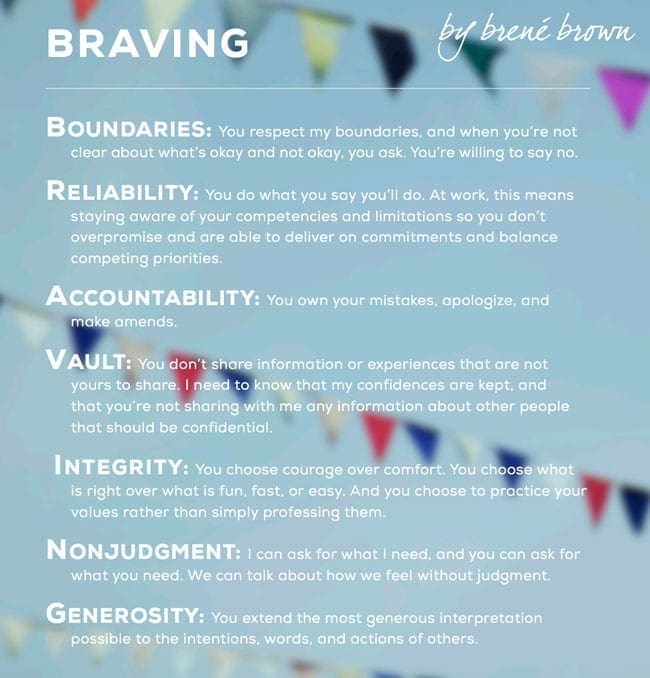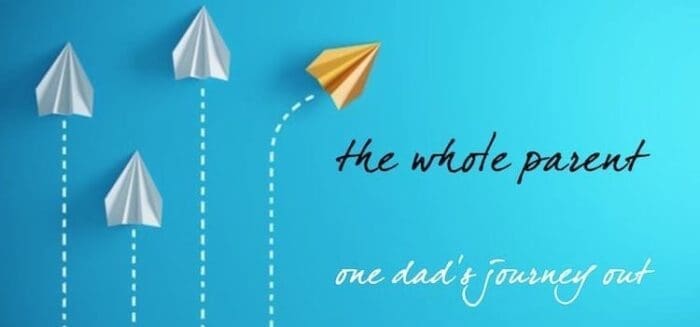The hard part, the brave part, as a man is to not try and fix my partner’s issue.
As men we are trained from birth to help women. We are taught a gentleman opens doors, holds chairs and stand when a woman enters the room. From birth, I was raised with the ultimate respect for women. It was easy, I was raised by three strong women and one absent (alcoholic) father. So, for me, respect for women is in my DNA.
Vulnerability
When Brené Brown did her breakthrough talk on vulnerability (The Power of Vulnerability – TED Talk), she had compiled all of her research on women. She was touring the world on the success of this talk when a man approached her after a speech and asked her, “Why do you only research women?” She mentions in her 2nd viral TED Talk, how this question struck her to the core. She did not have an answer. The man went on to say, “I guess that’s pretty convenient for you, then.” It was a burn. But Brené, being the badass she is, took on his challenge and gave us Listening To Shame – TED Talk, where she explores the relationships between men and women and their vulnerabilities.
From these two talks, I got my Brené wisdom and went forth into the world of dating, post-divorce, in search of a vulnerable and shame-aware woman. What I got as an answer for this quest is a woman who was well-read in Brene’s work and into her BRAVING concept. What we learned early on in our relationship was it’s easier to read about BRAVING. We both needed to work to be brave. We had not gotten close enough to any of our partners in the past to push across the boundaries and limits that come with BRAVING. So, we began with one another, learning to stand-in and stand-strong, while allowing our partner to experience and emerge from their own shame and struggles.
We can’t do it for another person. We can’t make someone else happy. We can’t make someone else behave the way we want, or sometimes need, them to. We can ask, but then we have to sit back and allow the individual to be themselves. This is not an easy task.
As a Man, I Want to Solve the Problem
In my experience, as a man, when I sense something is wrong in my relationship I rush to any of several unverified conjectures about what is wrong:
- I did something that has upset my partner
- Something I don’t know about has come out and my partner is now angry with me
- I’ve been caught in some kind of lie (that I may or may not be aware of)
- The world has delivered an unfair blow to my partner and I’m needed as a confidant or champion
- I’ve forgotten some vital commitment and now I’m in violation of our agreement
- (The kicker) I’m a bad person, and I did something disrespectful
These are my immediate, unconscious thoughts when my partner expresses discomfort or distress. And there are several problems with each of these “projections.” Here are some observations I’ve made in the last few months of this new “brave” relationship:
- Most of the time, I have no idea what my partner is upset about
- Most of the time, I did not cause the upset
- And even if I did cause my partner to be upset, my hyper-reaction can make it hard for me to listen, respond, and repair.
- Most of the time, I’m making up my own story about what’s going on
- Most of the time, I’m trying to mindread my partner
- Often, my partner’s upset is part of a healing journey they need to attend to on their own
- I cannot heal, fix, rescue, or love my partner out of their own distress
As I begin unpacking my knee-jerk reactions to my partner’s distress, I can start to parse out the feelings (“Oh crap, I’m responsible for the problem and therefore I’m a bad person.”) from reality. But it takes practice and effort to not drop into one of my own defense postures related to my imagined transgression.
My Own Braving Process
- Pause and pull out the feeling I am having (often the unconscious distress signal that is from my past and not related to the current events) for examination. And
- Ask my partner about their current distress (get more information)
And then, it’s time for the hard part, the brave part, as a man.
- Do not try to fix my partner’s issue.
Certainly, in the case where I have done something wrong, I can ask for forgiveness and go for the repair with my partner. But, 95% of the time, the issue, the upset, is not about me. And it’s not up to me to fix it. It’s not my responsibility to rescue my partner from their own issues and distress.
What I have to do, as a man, is remain strong, comforting, and relaxed. I have to be okay with my partner being not-okay. I have to let them have their own problems and distresses. I, as a man, cannot fix them. I cannot fix my partner’s pain. I can reassure them that I am present, loving, and available. And then I have to stand strong. I have to feel my own feelings about the distress and my desire to fix my partner. I have to stay in the uncomfortable place of my own distress rather than focusing my attention on my partner’s distress. This is BRAVING.
The utmost respect in a relationship is when you don’t rush in for the rescue when your partner is having a hard time. Distress is a part of life. Distress comes up for many reasons (triggers, upsetting events, mistakes, missed agreements, bad days, depression, exhaustion, hunger). And each individual, even as a couple, must take responsibility to work on, process, and heal their own distresses. Even if it’s the simple exhaustion and overwhelm of a difficult workday, I have to stand beside my partner and let them traverse their healing journey on their own.
I Will Stay Beside You As You Feel This
When I’m sitting in a room with my partner and I hear a desperate sigh, my first reaction is, “What can I do to help? What did I do to cause you this pain? Why are you in distress?” None of these questions are helpful to me or my sighing partner. My partner is merely expressing distress in a healthy and normal way. My partner does not need me to rescue them their own feelings of overwhelm or exhaustion. Of course, the reality is I can’t rescue them anyway.
In BRAVING I will do several things in this situation.
- I will stand clear in my own space and let you know I am reliable and available to you if you ask for my support
- I will deal with my own distress and unconscious need to fix, help, or rescue you
- I will be accountable if the cause of your distress was triggered by my actions
- I will let you be in your space, being upset or vulnerable, and I will not judge you for your struggle
- I will gladly respond to your direct requests for help
- I will willingly hold you and listen, if that is what you ask for
When my partner sighs in the room I immediately check my “shit list” for what I did wrong or what I can do to “fix” their distress. I am learning, It is my BRAVING role to not react to their general distress call. I can respond to specific requests for help, when that is what is required, but my immediate response should be to be present and be quiet. It’s hard: be present and be quiet.
What I am telling my partner in the moment is this:
“Your distress is okay. I can be with you in your vulnerability and I don’t have to rush to try and solve your problems. I am here for you when you need my strength and support.”
And the next step is for my partner to do their own self-awareness check. Are they having a feeling? Are they asking for help with a specific request? If they need help can they articulate specifically what they need, and what they don’t need? Do they just need to be heard and held?
I Love and Respect Your Path & Process
By allowing you to experience and process your own distress, without my interference, I am giving you the utmost respect. I am viewing you as whole, strong, and capable. And in my affirmation of you and your inherent ability to be strong and sufficient, I am reaffirming my belief in you. I am being generous with my attention: I will listen and be beside you, without being overbearing with my own need to rescue or fix you.
It’s hard for me not to rush in. It’s hard for me to hear a woman sigh (girlfriend, sister, mother) and not want to offer a suggestion or fix for what I “imagine” is their distress. How different for both of us to stand BRAVE and merely witness each other as complete and competent adults, while remaining vulnerable and available to our mutual love and respect. Love and respect, even while the other person is clearly in distress.
It is important for me to identify the unconscious mindreads. Then I can feel my own feelings about the situation and my “childhood” response to being raised by women. And as a whole and complete man, I can stand strongly beside my partner, in solidarity. I am saying to them.
“I am here for you.”
“You are enough. You’ve got this.”
“If you ask for my help, I will do the best I can.”
“You’re distress is not mine.”
“I love you, right now, just as you are.”
I need to repeat these things in my mind and get them very clear. I need to be more BRAVE. And in being brave my partner also becomes stronger and braver. That’s what we both asked for when we called in a Brené-centered relationship.
Brave on!
Namasté,
John McElhenney – life coach austin texas
Facebook | Instagram | Pinterest | @wholeparent
related posts:
- Grief is Underneath: A Divorce Fable
- Life of Dad – Talks to John About Single-Parenting and Dating Again
- Divorce Lessons: Thanks for the Jetpack, Where’s the Fuel?
Reference:
You can find all of my books on AMAZON.





